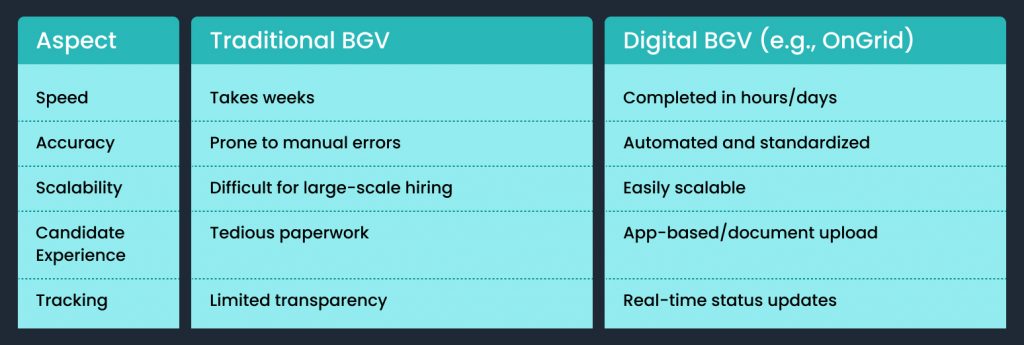Table of Contents
ToggleAs the hiring landscape becomes more competitive and dynamic, it is imperative that companies maintain the trustworthiness and integrity of new hires. You’re a startup, an enterprise, or a gig economy player, but employee background checks are no longer an option – they’re now a standard procedure. In a country like India, where industries operate across sectors such as IT and BFSI, healthcare, and logistics, strong background checks play a crucial role in protecting organizational reputation, ensuring workplace safety, and compliance with the law.
This in-depth guide tells you everything you should know about employee background verification in India—why it matters, how it works, legal aspects, and how platforms such as OnGrid are transforming the arena with secure and technology-enabled solutions.
Also read : Why Background Verification is a Must for the Gig Workforce
What Is Employee Background Verification?
Employee background verification is the process of authenticating a candidate’s identity, credentials, and history prior to hiring him or her. This can involve verification of:
Identity documents (e.g., Aadhaar, PAN)
Educational qualifications
Past work history
Criminal records
Address verification
Court and police records
Professional licenses or certifications
This process ensures employers are able to judge the credibility of a candidate, decreasing the likelihood of employing someone with false, incomplete, or misrepresented data.
Why Is Employee Background Verification Important in India?
1. High Incidence of Resume Fraud
10% of Indian background checks, according to a 2023 EY survey, were found to have discrepancies, the most prevalent being in employment history and educational qualifications. The applicants usually overstate job positions, inflate pay packages, or mention illusory degrees.
2. Regulatory Compliance
Industries such as BFSI, healthcare, and logistics are regulated intensely. Recruiting applicants without a valid background check can result in regulatory fines or legal actions.
3. Workplace Safety
Strict verification avoids hiring employees with a criminal record or history of office misconduct, thus promoting a secure and efficient work environment.
4. Reputation Management
In the current digital era, an individual employee’s offense can damage an organization’s reputation. Background screening reduces reputation risks from insider fraud or compliance breaches.
Major Elements of Employee Background Verification in India
Following are the primary types of verifications that are usually part of employee background verification:
1. Identity Verification
Verifies the correct identity of the individual through documents such as:
PAN
Voter ID
Passport
New-age verification platforms utilize APIs to instantaneously confirm government-issued IDs from provincial databases like UIDAI or NSDL.
2. Educational Verification
Verifies educational qualifications from schools, colleges, and universities. This includes validating enrollment, course completion, and graduation status.
Bogus degrees are becoming increasingly common, particularly from unrecognized institutes. OnGrid directly connects with provincial educational databases and institutes for rapid verification.
3. Employment History Check
Confirms the candidate’s past jobs, experience, responsibilities, and exit reasons. Inconsistency in experience is among the strongest warning signs during recruitment.
4. Criminal Record Verification
It entails verifying whether the candidate possesses any criminal records. It can be accomplished through:
Police verification
eFIR records
Court record checks across national and state databases
5. Address Verification
Verifies the current and/or permanent address of the candidate by physical visits or electronic means such as geo-tagged video verification or Aadhaar-based authentication.
6. Professional Reference Check
Obtains information from past employers, supervisors, or colleagues regarding the behavior, work quality, and attitude of the candidate.
Legal and Compliance Considerations
India lacks an independent law for background verification but is governed by various legal instruments:
1. Data Privacy and Consent
Employers are required to get explicit, informed consent of the candidate prior to conducting any background check. With the Digital Personal Data Protection (DPDP) Act, 2023, organizations have to ensure legal processing, secure storage, and restricted use of personal information.
2. Equal Opportunity Employment
Background checks should be uniformly applied to all candidates to prevent discrimination on grounds of gender, caste, religion, or region.
3. Use of Verified Data Sources
It’s critical to employ authenticated, valid sources of data—unauthorized data surveillance or scraping would generate legal exposures.
OnGrid, for example, conducts background checks within compliance environments through safe, consented processes and audit trails.
Industry-Wise Significance of Background Authentication
IT and Tech
With remote and hybrid work arrangements, verification of identity and addresses has become imperative. Background verification prevents insider attacks and data leaks.
BFSI
Mandatory due diligence for KYC, AML (Anti-Money Laundering), and other compliance norms make background screening essential. Financial credibility and criminal background checks are emphasized.
Healthcare
Doctors, nurses, and caregivers must be verified for certifications, licenses, and misconduct history, especially in private hospitals or homecare setups.
Gig and Blue-Collar Workforce
Gig workers in delivery, transport, and home services often operate in unsupervised roles. Quick and scalable verification ensures public safety and brand protection.
Traditional vs. Digital Background Verification

Digital platforms like OnGrid provide an API-first, consent-driven, and fully auditable approach to employee background verification, making it efficient, compliant, and candidate-friendly.
How OnGrid Simplifies Background Verification
OnGrid is India’s top background verification and trust enablement platform. Here’s how it makes a difference:
1. Compliance and Data security
ISO Certified paperless platform for end to end background screening
2. Customized Solutions
Flexibility to pick and choose from 150+ background checks that suit your singular hiring requirements
3. Fast Turnaround Time
OnGrid’s strong verification processes guarantees over 90% of cases done in less than 5 working days, while initial checks done in 4 hrs
4.Precision and Accuracy
Recommended by 3000+ businesses operating in 25+ sectors in India, OnGrid provides ISO compliant audit ready verification reports. Trust is the basis of our service
Conclusion
In the modern-day high-risk recruitment system, background verification of employees is not merely a ritual—it’s a strategic imperative. It safeguards your reputation, guarantees regulatory adherence, and creates a secure work environment. From recruiting a delivery executive to inducting a CXO, identity, credential, and history verification has to be an integral step.
As India’s labor force becomes more vibrant and dispersed, the requirement for speedy, accurate, and compliant background checks is greater than ever before. Digital-first platforms such as OnGrid enable organizations to onboard reliable talent by role and geography through a scalable, safe, and smooth process.
FAQs
Q1. What is employee background verification and why is it important?
Employee background verification is the process of confirming a candidate’s identity, credentials, and history in order to provide secure and compliant employment.
Q2. What documents are usually verified under background checks in India?
Usually verified documents are Aadhaar, PAN, educational certificates, employment history, address proof, and police or court documents.
Q3. How long does it take for the background verification process?
Traditional processes take weeks, whereas online portals such as OnGrid finish most of the checks in 5 working days.
Q4. How is consent obtained for background verification in India?
Consent is usually obtained through a signed document or electronically through secure portals prior to conducting any checks.
Q5. Are background checks legal in India?
Yes, if they adhere to due consent processes and respect data privacy legislation such as the DPDP Act, 2023.





Leave a Reply